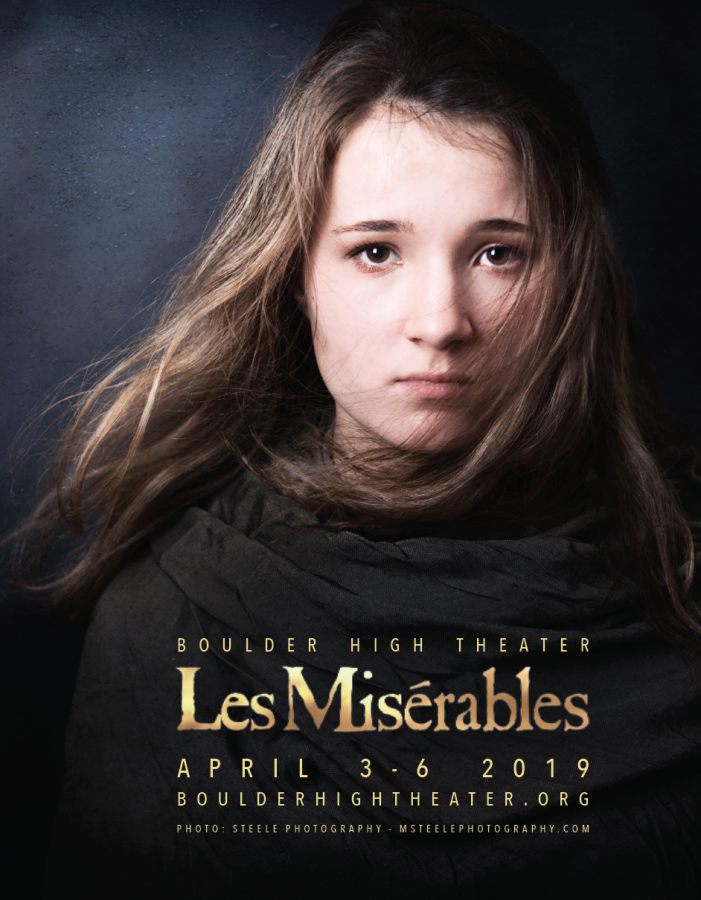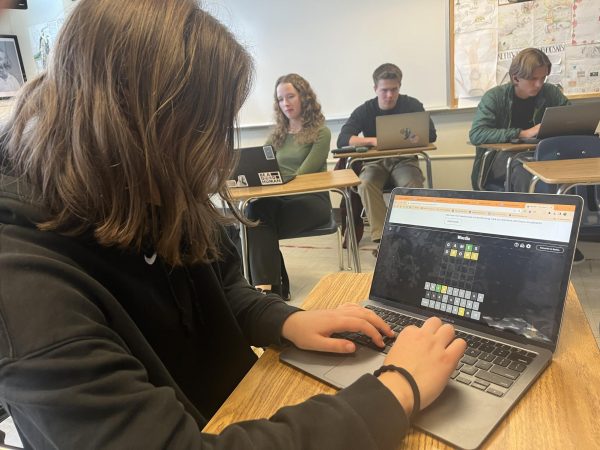Les Misérables Review
On April 3rd through 6th, the Boulder High Theater put on a performance of Les Misérables that can only be described as impeccable.
But really, how so? All in all, this was one of the best productions I’ve seen in my life. It far outclassed anything you’d expect from a high school theater troupe and even exceeded some of the professional shows I’ve watched before. Aside from the amazing tech—headset microphones for each of the characters, a rotating stage, props that descended from the ceiling, guns that shot actual fire—the singers were outstanding, the costumes beautiful, the acting flawless. As it came to a close, half the audience members were in tears, and the cast received a standing ovation with thunderous applause.
Les Mis has a stunningly large casualty count. Out of the eleven leads, only four survive, two of whom are villains. Aside from nameless citizens and officers, pretty much every non-main was dead by the end. Particularly noticeable were the students, who were gunned down fighting for their country, and whose ghosts looked mournfully over the stage as the production came to a close.
And, a little piece on the history. Contrary to some mistaken first impressions, Les Mis isn’t about the French Revolution at all. It takes place almost fifty years later, after the death of a popular general named Jean Maximilien Lamarque sparked groups of workers, students, and citizens to gather together and take up arms against the government. The author of Les Misérables (the book version), Victor Hugo, who had been writing a play in the nearby Tuileries Gardens, heard gunfire from somewhere around Les Halles and went to investigate. On the former Rue de Bout du Monde, he was caught between the warring sides, hiding between two columns for half an hour while they shot at each other. He included the memories in his book.
In terms of individual exhibitions, the actors blew away any possible criticism. Every voice sounded amazing, and the leads were leads for a reason.
Aidan Robie (Jean Valjean) became the part so completely that you forgot you weren’t watching the real thing, with a forceful portrayal that evoked lots of anguish and a tragic death scene done so well it left the crowd in denial that such a great person could be gone. (You’ll see that amazingly-done ends are a theme.) Following Valjean over the years and watching his progression through life, you couldn’t help but become attached.
How did this specific role challenge you? Was it harder or easier than other roles you’ve played?
Acting-wise, it’s not the most challenging, but vocal-wise, it’s the hardest. There’s really high stuff and really low stuff and it’s hard to balance them. I need to always keep my voice healthy.
What’s some behind-the-scenes insight on the theater program? On Les Mis?
Les Mis is very inclusive and self-sufficient and hard-working.
What were your expectations going into this production? Have they been met?
Yes, my expectations were… well, I’ve known this whole show since I was 3 years old, so [they] were set really high. And we’ve reached them.
What do you think the end results will be?
A really good show with hardworking band, actors, tech, directors, and everyone working really hard for a really good show.
What has been your strongest point in this performance? How do you think you got there?
Vocally, and the maturity of the role—a good dad role in the show.
What are some tips you’d give to any aspiring actors who are thinking of trying out for next year’s musical?
Be confident in yourself, be prepared, and make sure you love what you’re doing.
Brooke Curry (Eponine) poured enough longing into her words that you mourned for her impossible love aside her, right up until her heartbreaking demise.
Korben Smart (Javert) performed a villain so smoothly it had the gathering caring for him as much as any of the protagonists. In a past interview, he mentioned that his suicide scene was both the strongest and hardest component of his display since it was so much emotion packed into so little time. He handled it perfectly.
How did this specific role challenge you? Was it harder or easier than other roles you’ve played?
It’s definitely a little harder than other roles I’ve played because it doesn’t have a lot of character development shown on stage. The musical happens over many years, and my character is sort of just growing in the background.
What’s some behind-the-scenes insight on the theater program? On Les Mis?
[Les Mis] is hectic, it’s fun, it’s long, but it is one of the most rewarding clubs in this school, ’cause when it really all comes together it’s a sight to behold by everyone—it just takes a lot to get there.
What were your expectations going into this production? Have they been met?
I expected a lot and every day we’re meeting those expectations. [They] are unreasonably high now that I’ve been here for four years, and somehow we managed to meet and exceed them all.
What has been your strongest point in this performance? How do you think you got there?
The suicide scene, because it’s a lot of emotion packed into not a lot of time.
What are some tips you’d give to any aspiring actors who are thinking of trying out for next year’s musical?
If you don’t make it on the cast still join tech. There’s plenty of opportunities. No matter what happens, make friends.
Brynn Hughes (Madame Thénardier) acted so accurately that the onlookers both pitied and laughed at her—in a good way: she was meant to be humorous. It was hilarious and just a little bit sad, but she reflected the grief without stumbling once.
Clara Hunter (young Cosette) had a sentimental melody that demonstrated the role excellently. She made the spectators pity Cosette and her predicament with her sweet, child-like vocals that thoroughly expressed the thoughts and desires of her persona.
Ella Blankenship (older Cosette) had beautiful presentations that illustrated Cosette’s yearning for the stranger she had fallen in love with. You cheered at her wedding, cried along with her at her father’s departure, and applauded her resilience throughout such a difficult life—a feat that could only be achieved with an amazing and successful actress.
Erik Larsson (Marius) was one of the few people who didn’t die in the show, and yet you mourned him just as much as the others. Seeing his dilemma of falling in love with Cosette without even knowing her name, his unrequited affection from Eponine, and his suffering through the death of his friends, you couldn’t help but feel sorry for him. He transitioned into his part seamlessly, without a single crack in the facade.
Jesse Shafroth (Enjolras) had powerful vocals that revealed the tough nature of his character. He seemed completely in tune with the guise, and it resonated with every forceful word he sang.
How did this specific role challenge you? Was it harder or easier than other roles you’ve played?
What was particularly challenging is that I’ve never really been a role like [him] in the past. Enjolras is a powerful, strong leader and I’ve always been the nerdy, geeky, kind of stupid person in shows. Like when I was Mark from Rent.
What’s some behind-the-scenes insight on the theater program? On Les Mis?
It’s definitely a different family. Everyone here is super close together and we’re all into what we do and making shows and art. That’s why we put on great shows, ’cause we’re all into what we’re doing and we love each other. At the end of the day we all love and respect each other.
Joseph Whitney (Monsieur Thénardier) was superb in a way that instead of hating someone who was obviously a villain, you looked forward to his next amusing appearance on the stage to lighten the mood of a sorrow-filled musical.
Lou Abecassis (Fantine) sounded incredibly compelling and melodic, possessed an amazing singing voice, and achieved a wonderful performance of the song “I Dreamed a Dream.” In a previous interview, she confided that she practiced it every night.
How did this specific role challenge you?
It was kind of difficult to act because [my role] is supposed to be a mother, and I’m not a mother. … I try to equate people in my life to a child to help my performance.
Was it harder or easier than other roles you’ve played?
It’s definitely much harder.
What’s some behind-the-scenes insight on the theater program? On Les Mis?
We [especially] love our techies. People don’t realize that they put on the entire show. They make the set and do all the costumes. Techies are the reasons we’re not naked on stage. They’re great.
What were your expectations going into this production? Have they been met?
I expected a lot of stress. I was right. It’s stressful but also a really great community being formed.
What has been your strongest point in this performance? How do you think you got there?
My vocals for I Dreamed a Dream are really strong because I practice them every night.
What are some tips you’d give to any aspiring actors who are thinking of trying out for next year’s musical?
Be yourself. Have fun. Create a community here.
Gavroche, or Spencer Neumann, was so good he was nominated for Rising Star (all of Boulder High should cross their fingers that he wins it), with an ending scene that left barely a dry eye in the theater.
Citations







